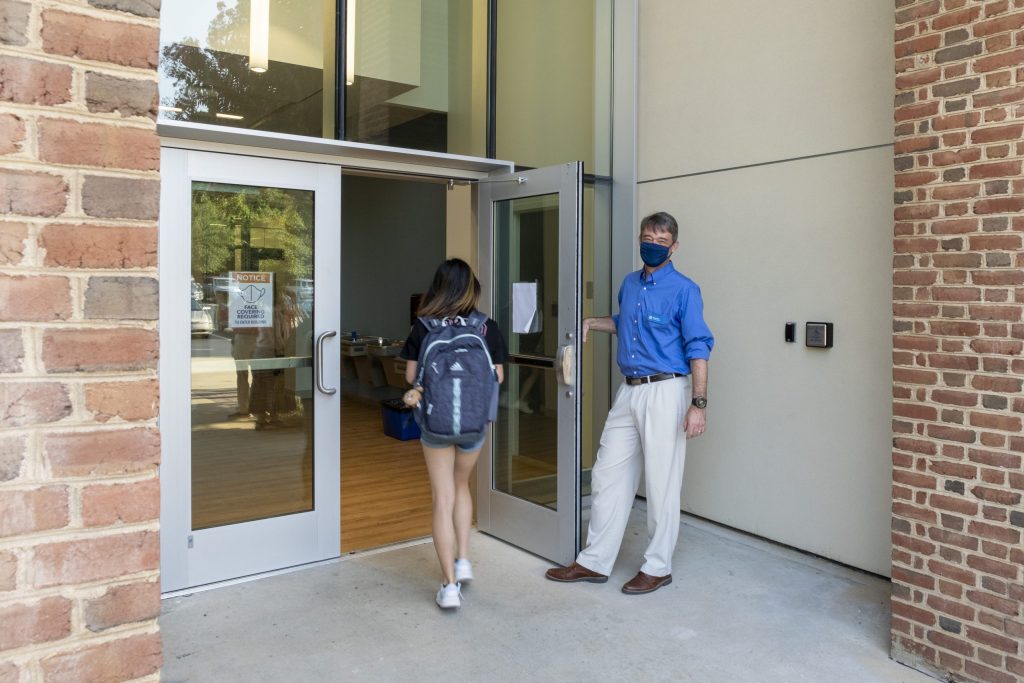Yes, students, I know that I typically start my weekly emails with that opening to you. I like that beginning, though, because it combines two important elements: my love of delicious language, and my respect for you. So, once again, in the spirit of literal and figurative introductions, salutations to you, and to all parents, alumni, and/or Middle School students who happen to be reading this epistle.
We are starting the school year, and I’ve naturally been thinking about how you are transitioning into all the newness—the new classes, the new classrooms of the Upper School, the new schedule. And paradoxically over the past few weeks, along with all my conversations with you, I’ve also been chatting with some of the alumni, who, unprompted, have helped remind me of some of the timeless elements of Cary Academy—both the good and the challenging.
A few days ago, I ran into a former student gabbing with a teacher in the CMS. He was laughing as he recounted how he and some friends had built a fort of furniture in the middle of the CMS lobby a few years ago. I remembered that building–the edifice definitely towered overhead, much to my chagrin at the time.* I joined the current discussion, and the alum reminisced a bit more about friends, about cross country, about various classes, about being in the hallways. Then, as we talked about his college experience, he interjected, “and I just have to say, the College Counseling Office is awesome!” He mentioned their help as he looked at college fit, rather than university name. He mentioned the excitement that they shared with him as he worked through the opportunities.
Not once did he mention his grades from Cary Academy.
I met with another alumnus several weeks earlier, and in our conversation, we reflected on the opposite of relationships, talking about the pressures that students face at Cary Academy. Yes, Cary Academy avoids the overt methods of measurement: we don’t calculate GPA or class rank. But that person described the quiet ways that CA students tend to measure themselves against each other—number of advanced courses taken, grades achieved, colleges applied to, hours overworked. “And the funny thing is,” this person said, “once I got to college, none of it mattered. Everything that I thought was so important in high school—the things I got stressed about—they weren’t that important. I wish I knew then what I know now.” What did the alum really remember? The relationships. The work ethic that was developed. The stories about interactions with others.
I’m sharing those words with you for obvious reasons.
The college counselors, in all their talks with you, whether you are in grades 9, 10, 11, or 12, offer one key piece of advice: focus on building your life. You are crafting experiences with friends. You are exploring topics that intrigue you. You are using your creativity for good (yes, the furniture fort is chaotic good, more or less).
So I am tying those wise words from the college counselors together with the reflections from people who have walked your pathways from science classrooms to English seminars to history discussions to art room creations to playing fields to debate rooms to math competitions. Yes, get good grades, but avoid that mistaken belief that you are measured by a letter or number. And even though your teenage brain is demanding that you compare yourself in some way to the people around you, remember that those comparisons are ephemeral. They feel so important right now. They will be meaningless in several years.
I’m sharing these stories now, at the start of the school year, because in this year of new, in this exhausting time of yet more COVID, it’s more important than ever that you are learning for you. Find ways to embrace the joy in that journey.
On Tuesday afternoon, I spent an advisory period with a group of seniors, and they demonstrated the best of learning for oneself, of developing relationships, of honing a work ethic. Yes, they had to accomplish various tasks, and they did so, bouncing between focused (how do I complete this portion of the Common App?) to the not so focused, from the inventive to the joyfully silly. And they did it with each other.
So, esteemed learners, find joy in this year. Support each other. Listen to the college counselors. Eschew measuring yourselves against your friends (or even your frenemies).
And have a good year.
*A description of previous questionable decisions does not grant approval for future bad choices. So please don’t try to build furniture forts (or fortresses of any type) anywhere on campus, even if a couch-based structure in the past was an example of chaotic good.

